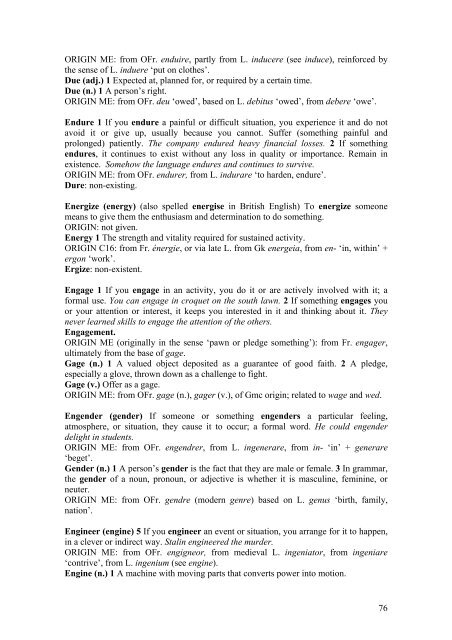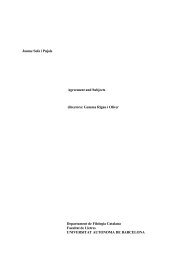Prefixation in English and Catalan - Departament de Filologia ...
Prefixation in English and Catalan - Departament de Filologia ...
Prefixation in English and Catalan - Departament de Filologia ...
Create successful ePaper yourself
Turn your PDF publications into a flip-book with our unique Google optimized e-Paper software.
ORIGIN ME: from OFr. enduire, partly from L. <strong>in</strong>ducere (see <strong>in</strong>duce), re<strong>in</strong>forced by<br />
the sense of L. <strong>in</strong>duere ‘put on clothes’.<br />
Due (adj.) 1 Expected at, planned for, or required by a certa<strong>in</strong> time.<br />
Due (n.) 1 A person’s right.<br />
ORIGIN ME: from OFr. <strong>de</strong>u ‘owed’, based on L. <strong>de</strong>bitus ‘owed’, from <strong>de</strong>bere ‘owe’.<br />
Endure 1 If you endure a pa<strong>in</strong>ful or difficult situation, you experience it <strong>and</strong> do not<br />
avoid it or give up, usually because you cannot. Suffer (someth<strong>in</strong>g pa<strong>in</strong>ful <strong>and</strong><br />
prolonged) patiently. The company endured heavy f<strong>in</strong>ancial losses. 2 If someth<strong>in</strong>g<br />
endures, it cont<strong>in</strong>ues to exist without any loss <strong>in</strong> quality or importance. Rema<strong>in</strong> <strong>in</strong><br />
existence. Somehow the language endures <strong>and</strong> cont<strong>in</strong>ues to survive.<br />
ORIGIN ME: from OFr. endurer, from L. <strong>in</strong>durare ‘to har<strong>de</strong>n, endure’.<br />
Dure: non-exist<strong>in</strong>g.<br />
Energize (energy) (also spelled energise <strong>in</strong> British <strong>English</strong>) To energize someone<br />
means to give them the enthusiasm <strong>and</strong> <strong>de</strong>term<strong>in</strong>ation to do someth<strong>in</strong>g.<br />
ORIGIN: not given.<br />
Energy 1 The strength <strong>and</strong> vitality required for susta<strong>in</strong>ed activity.<br />
ORIGIN C16: from Fr. énergie, or via late L. from Gk energeia, from en- ‘<strong>in</strong>, with<strong>in</strong>’ +<br />
ergon ‘work’.<br />
Ergize: non-existent.<br />
Engage 1 If you engage <strong>in</strong> an activity, you do it or are actively <strong>in</strong>volved with it; a<br />
formal use. You can engage <strong>in</strong> croquet on the south lawn. 2 If someth<strong>in</strong>g engages you<br />
or your attention or <strong>in</strong>terest, it keeps you <strong>in</strong>terested <strong>in</strong> it <strong>and</strong> th<strong>in</strong>k<strong>in</strong>g about it. They<br />
never learned skills to engage the attention of the others.<br />
Engagement.<br />
ORIGIN ME (orig<strong>in</strong>ally <strong>in</strong> the sense ‘pawn or pledge someth<strong>in</strong>g’): from Fr. engager,<br />
ultimately from the base of gage.<br />
Gage (n.) 1 A valued object <strong>de</strong>posited as a guarantee of good faith. 2 A pledge,<br />
especially a glove, thrown down as a challenge to fight.<br />
Gage (v.) Offer as a gage.<br />
ORIGIN ME: from OFr. gage (n.), gager (v.), of Gmc orig<strong>in</strong>; related to wage <strong>and</strong> wed.<br />
Engen<strong>de</strong>r (gen<strong>de</strong>r) If someone or someth<strong>in</strong>g engen<strong>de</strong>rs a particular feel<strong>in</strong>g,<br />
atmosphere, or situation, they cause it to occur; a formal word. He could engen<strong>de</strong>r<br />
<strong>de</strong>light <strong>in</strong> stu<strong>de</strong>nts.<br />
ORIGIN ME: from OFr. engendrer, from L. <strong>in</strong>generare, from <strong>in</strong>- ‘<strong>in</strong>’ + generare<br />
‘beget’.<br />
Gen<strong>de</strong>r (n.) 1 A person’s gen<strong>de</strong>r is the fact that they are male or female. 3 In grammar,<br />
the gen<strong>de</strong>r of a noun, pronoun, or adjective is whether it is mascul<strong>in</strong>e, fem<strong>in</strong><strong>in</strong>e, or<br />
neuter.<br />
ORIGIN ME: from OFr. gendre (mo<strong>de</strong>rn genre) based on L. genus ‘birth, family,<br />
nation’.<br />
Eng<strong>in</strong>eer (eng<strong>in</strong>e) 5 If you eng<strong>in</strong>eer an event or situation, you arrange for it to happen,<br />
<strong>in</strong> a clever or <strong>in</strong>direct way. Stal<strong>in</strong> eng<strong>in</strong>eered the mur<strong>de</strong>r.<br />
ORIGIN ME: from OFr. engigneor, from medieval L. <strong>in</strong>geniator, from <strong>in</strong>geniare<br />
‘contrive’, from L. <strong>in</strong>genium (see eng<strong>in</strong>e).<br />
Eng<strong>in</strong>e (n.) 1 A mach<strong>in</strong>e with mov<strong>in</strong>g parts that converts power <strong>in</strong>to motion.<br />
76
















